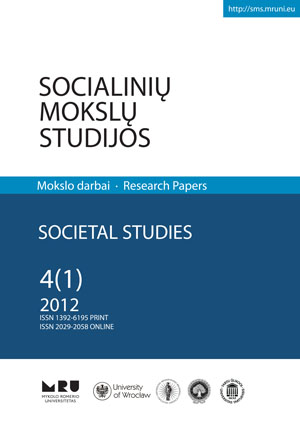Bausmių bendrinimas su ankstesniu nuosprendžiu paskirtomis ir subendrintomis bausmėmis pagal Lietuvos Respublikos baudžiamojo kodekso 63 straipsnio 9
Combining Sentences with Sentences Combined by an Earlier Judgment According to Article 63(9) of the Criminal Code
Author(s): Tomas GirdenisSubject(s): Social Sciences
Published by: Mykolas Romeris University
Keywords: criminal law; multiple offenses; sentencing; imposition of a combined sentence; imposition of a combined sentence with sentences combined by an earlier judgment
Summary/Abstract: This article examines rules set in court practice when imposing a final combined sentence according to Article 63(9) of the Criminal Code of Lithuania, when sentences are combined with those combined by an earlier judgment. While performing a research for the article, it was noticed that the case-law is contradictory when penalties are being combined in the situation provided for in Article 63(9) of the Criminal Code. The Supreme Court of Lithuania has adopted two judgments that contradict each other. Therefore, the main purpose of this research is to provide rules of sentencing for multiple offenses when imposing a final combined sentence according to Article 63(9) of the Criminal Code, where sentences are combined with sentences combined by an earlier judgment without violating the right to a fair trial and the principle of equality before the law. The latest ruling of the Division of Criminal Cases of the Supreme Court, adopted in 2007 established a precedent obliging courts imposing a final combined sentence according to article 63(9) of the Criminal Code to combine sentences of separate criminal acts with sentences combined by an earlier judgment. This rule is convenient to judges imposing a final combined sentence, however, in some cases it may violate the right to a fair trial and the principle of equality before the law. In some cases the court should impose a consolidated sentence for some criminal acts (where the committed criminal acts differ markedly in their degree of danger and are assigned to different types or categories of criminal acts according to Articles 10 or 11 of the Criminal Code) and fully or partially cumulative sentence for other. Therefore, if the court is obligated to combine sentences with sentences already combined by an earlier judgment, in some cases it is impossible for the court to impose a consolidated sentence for some of the crimes. In this case a person found guilty of multiple offenses can be sentenced more severely only because the State has chosen (even for objective reasons) to have separate trials. The person’s criminal liability should not depend on the State’s choice of criminal procedures. Therefore, the author agrees with the earlier ruling of the Division of Criminal Cases of the Supreme Court, adopted in 2005, according to which in the event of multiple offences sentences imposed for separate criminal acts should be combined, and not the sentences already combined.
Journal: Socialinių mokslų studijos
- Issue Year: 4/2012
- Issue No: 1
- Page Range: 299-308
- Page Count: 10
- Language: Lithuanian

